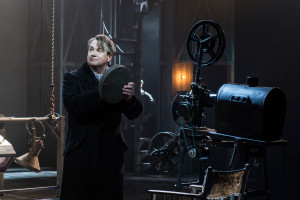Mack and Mabel is the tale of the dynamic duo who for a period ruled the silent movie era; Mack was the visionary and Mabel his star. With Mack’s obsession in finding the comedy in film and making people laugh I am reminded that some humour and laughter is certainly what we need right now in this world.
Charlie Chaplin, who was not featured in the story but who worked alongside Mabel in many of Mack’s movies, summed up the essence of finding happiness despite life’s pitfalls perfectly in his composition of his song ‘Smile’, lyrics were later added by John Turner and Geoffrey Parsons in 1954. This certainly was an era which capitalised on finding the humour, comedic value before spoken word and serious drama could take prominence.
The opening music hung in the air exquisitely by the orchestra and took me right to the era’s ambiance; creating the feel of the comedic fun and frolics dominated by the staccato attack on piano frequently heard in chase scenes by the keystone cops.
Michael Ball
Rebecca LaChance
The heart of the story is Mack’s reflections back on an era he dominated and also woeful regrets of his ambition causing him to lose the woman he loved. In the opening scene Mack invites us in on his reminiscent journey as he revisits his old studios in 1938. Opening numbers of ‘Movies Were Movies’ and ’Look What Happened To Mabel’ embodied the feeling of the era and the beginning of Mabel’s rags to riches tale of an ordinary girl being propelled into a world where ordinary just didn’t cut it no more. It was the feeling that Hollywood was really the pinnacle of reaching stardom and the dizzy heights of being a movie star, but was that really what Mabel wanted or did she just get caught up in the dream that she could have it all?
Mabel’s love affair with Mack develops quickly and it would be great to see more exploration of that being more than just their mutual understanding of ‘venison and peppercorn for dinner’ as Mabel puts it when she invites Mack over for dinner referring to their frequent one night affairs. You see a naivety and innocence to the character of Mabel here, when she fails to see that Mack’s ambition is ultimately centre stage in his life. Great vocals from West End legend Michael Ball who clearly felt at home as Mack Sennett and Rebecca LaChance as Mabel who complimented Ball’s ‘I Won’t Send Roses’ with her reprise.
Mack’s ambition is the main objective in this story and it is hard to find him likeable when his selfish ignorance is a gnawing fact which Michael Ball plays with confidence. This ambition undoubtedly leaves Mabel and his other colleagues out in the cold and gives Mabel no other choice than to turn to Mack’s rival William Desmond Taylor for a chance of being a real actress and not just Mack’s puppet.
The Keystone Cops
One of my favourite parts of the performance was the fantastic choreography of the keystone cops sequence, bathing beauties and the use of footage running behind during the dance sequences, which really captured the revolutionary moment of Mack Sennett making silent movie history and front page news with these historic characters.
The toe tapping, heart beating performance by the marvelous Anna-Jane Casey as Lottie Ames who gets her chance in the spotlight after Mabel leaves keystone studios, really electrified the audience and had me wanting to get up from my seat and relieve my tap dancing ambitions. However the seamless stomping numbers failed to make up for a plot stuck between an optimistic musical and a heartbreaking tale of a young starlet on the brink of stardom destroyed by the gifted performer’s antichrist; drugs. I would have loved to have seen the cause of Mabel’s decline explored further and not so rushed as there have been tales of a secret drug pusher at the studio. However, I do appreciate that Mack and Mabel the musical may not have been billed quite the same if that was the case.
Mack and Mabel took us on a journey back to the height of the silent movie era and perfectly embodied the comedic times of slapstick humour that will indeed have you laughing 100 years on. Michael Ball inhabited Mack Sennett perfectly and I felt comfortable in the knowledge that he had Sennett’s absolute conviction that ‘Movies Were Movies’ when he ran the show. Mabel’s demise was a huge part of Sennett’s tale but as Sennett said in the closing scene ‘that’s how I will remember her’ as footage of her in the prime of her career ran behind; I will do well to remember the same.
Chichester Festival Theatre’s production of Mack and Mabel continues it’s run at the Wales Millennium Centre until 6th December
Photography: Manuel Harlan



Comments